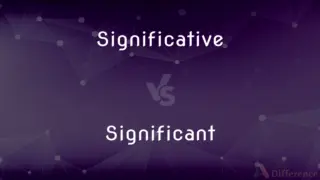Intestate vs. Testate — What's the Difference?
Edited by Tayyaba Rehman — By Maham Liaqat — Updated on May 6, 2024
Intestate refers to the situation where a person dies without a valid will, while testate indicates that the deceased left a valid will outlining the distribution of their estate.

Difference Between Intestate and Testate
Table of Contents
ADVERTISEMENT
Key Differences
Intestate denotes a situation where someone passes away without leaving a valid will. In this case, the estate is distributed based on local laws, usually prioritizing immediate family members. On the other hand, testate describes a person who has died with a will in place, specifying how their estate should be managed.
In intestate situations, state or country-specific inheritance laws guide who receives the assets, potentially leaving some beneficiaries at a disadvantage. Whereas with a testate scenario, the distribution follows the explicit wishes of the deceased, which can help avoid familial disputes.
Without a will, the intestate process may involve a court-appointed administrator to oversee the estate distribution, which can lead to delays. Conversely, testate arrangements often designate an executor, simplifying and expediting estate management.
In intestate cases, certain assets may pass directly to legal heirs without being allocated by the deceased’s personal preferences. With testate, the will can assign specific assets to particular beneficiaries, reflecting the deceased’s desires.
Intestate procedures may involve higher legal fees due to the probate process and the appointment of an administrator. Testate processes often cost less because of the clarity provided by a legally recognized will.
ADVERTISEMENT
Comparison Chart
Definition
No valid will is left by the deceased.
Valid will specifies estate distribution.
Distribution
Governed by state or local inheritance laws.
Directed by the wishes outlined in the will.
Administration
Court appoints an estate administrator.
Executor named in the will manages the estate.
Asset Allocation
Heirs receive assets per legal inheritance hierarchy.
Beneficiaries receive assets as specified in the will.
Costs
May involve higher legal fees due to probate.
Typically involves lower legal fees.
Compare with Definitions
Intestate
Not specifying any beneficiaries.
Intestate cases often lead to disputes among potential heirs.
Testate
Refers to leaving a will upon death.
Her estate passed smoothly since she died testate.
Intestate
Governed by rules of intestacy.
Intestate laws ensured his children inherited equally.
Testate
Relating to the existence of a legally recognized will.
Testate estates often avoid probate delays.
Intestate
A person who has died without a will.
As an intestate, his estate required a court-appointed administrator.
Testate
Indicating the presence of a testament.
Testate documents clearly outlined his last wishes.
Intestate
Relating to intestacy laws and procedures.
The intestate estate was distributed to immediate family members.
Testate
Concerning the management of a will.
Testate estates are managed by a designated executor.
Intestate
Having made no legal will
An intestate parent.
Testate
(legal) one who has left a valid will and testament
Intestate
Not disposed of by a legal will
Intestate lands.
Testate
Having made and left a will; as, a person is said to die testate.
Intestate
One who dies without a legal will.
Testate
A person who makes a will
Intestate
Not devised or bequeathed; not disposed of by will.
Intestate
(legal) A person who dies without making a valid will.
Intestate
Without having made a valid will; without a will; as, to die intestate.
Airy succeeders of intestate joys.
Intestate
Not devised or bequeathed; not disposed of by will; as, an intestate estate.
Intestate
A person who dies without making a valid will.
Common Curiosities
What is a testate estate?
A testate estate is one where the deceased has left a legally valid will.
Can an intestate estate be contested?
Intestate estates can face challenges but follow strict legal guidelines.
What does intestate mean?
Intestate means dying without a valid will.
How is an intestate estate distributed?
Intestate estates are distributed based on local inheritance laws.
How does testate estate administration differ from intestate?
Testate estates are managed by an executor named in the will, simplifying administration.
Does having a will prevent probate?
A will may not fully prevent probate but generally simplifies the process.
What happens if a will isn't valid?
If a will isn't legally valid, the estate is treated as intestate.
Is a will valid without witnesses?
Most jurisdictions require witnesses for a will to be considered valid.
Who manages an intestate estate?
An intestate estate is managed by a court-appointed administrator.
Do intestate laws vary by jurisdiction?
Yes, inheritance laws vary depending on the state or country.
Can an intestate estate bypass probate?
Intestate estates typically undergo probate to confirm inheritance distribution.
Can a will be handwritten?
Some jurisdictions accept handwritten (holographic) wills if properly signed and dated.
What are residuary beneficiaries?
Residuary beneficiaries receive the remaining estate after specific gifts are allocated.
Can a will be contested?
Yes, but it often requires proving undue influence, fraud, or lack of capacity.
Are heirs the same as beneficiaries?
Not necessarily; heirs inherit by law, while beneficiaries are named in a will.
Share Your Discovery

Previous Comparison
Dismember vs. Remember
Next Comparison
Significative vs. SignificantAuthor Spotlight
Written by
Maham LiaqatEdited by
Tayyaba RehmanTayyaba Rehman is a distinguished writer, currently serving as a primary contributor to askdifference.com. As a researcher in semantics and etymology, Tayyaba's passion for the complexity of languages and their distinctions has found a perfect home on the platform. Tayyaba delves into the intricacies of language, distinguishing between commonly confused words and phrases, thereby providing clarity for readers worldwide.












































